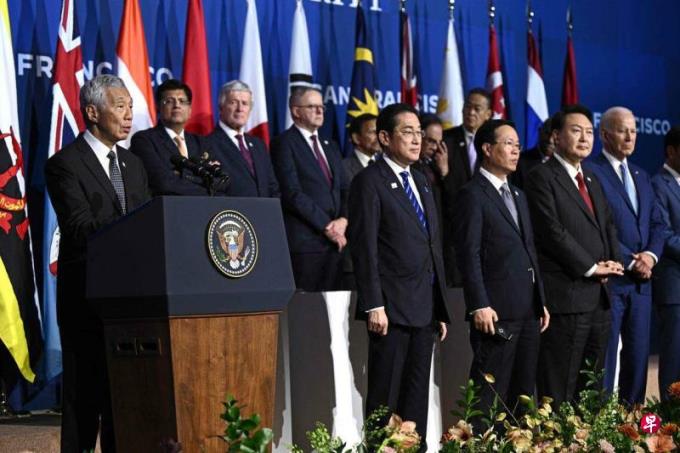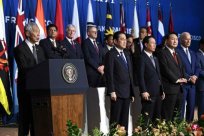
The three pillars of the Indo -Pacific Economic Framework completed the negotiations, and the fourth largest pillar trade must still be further negotiated.The leaders of the Indo -Pacific Economic Framework issued a joint statement, emphasizing that the 13 countries participating in the trading pillar have made progress and will continue to work hard to achieve mutual benefit.
According to the statement, this includes: through strong and executable labor standards to improve workers' rights; improve the economic opportunities of families, pastures and farmers, as well as small and medium -sized enterprises;With technical assistance and economic cooperation, benefiting from all levels of society.
The Leader Meeting of the Indo-Pacific Economic Framework (IPEF) On November 16, San Francisco time (November 17, Singapore time), at 亚太经济合作组织(APEC)领导人非正式会议期间举行。New Prime Minister Li Xianlong welcomed the progress of the trade agreement when he spoke at the meeting.
Li Xianlong said that trade is the lifeblood of the global economy, the trading pillar is an IPEF, and the United States' indispensable part of the economic and strategic exchanges in the region.
However, it is not easy for trade policy to formulate novel and creative practices. It takes time to carefully handle sensitive areas, and choose the best time to make commitments to the agreement.Li Xianlong said that it is expected that this negotiation and actual cooperation will make further progress next year.
When US President Biden visited Japan last May, he officially announced the start of the IPEF.It has four pillars, namely fair and tough trade, supply chain, cleaning economy through energy transformation and de -carbonization, and strengthening anti -corruption and tax measures to achieve a fair economy.
Signing the supply chain agreement IPEF leader: speed creation record
One and a half years, IPEF member states signed the world's first supply chain tough agreement in San Francisco, and agreements on the cleaning economy and fair economy have also basically completed negotiations.IPEF leaders described in a joint statement that they "achieved the goal at a record speed."
However, in terms of trade negotiations, according to the Nikkei report, the United States requires the formulation of rules to set up high labor and environmental standards for product development.Southeast Asian countries oppose rigorous requirements without cutting the sweetness of tariffs.
IPEF has 14 member states. In addition to the United States, there are Australia, Brunei, Fiji, India, Indonesia, Japan, South Korea, Malaysia, New Zealand, the Philippines, Singapore, Thailand and Vietnam.India has not participated in the IPEF trading pillar.
IPEF Leaders' joint statement also announced that the IPEF key mineral dialogue also promoted more close cooperation in strengthening the IPEF key mineral supply chain and improving regional economic competitiveness.Countries also intend to explore more measures, and promote cooperation and dialogue with the areas of energy security and technology.
Leaders also realize that mobilizing high -standard public and private funds, including expanding the scale of preferential financing under the right situation, will promote investment in supply chain toughness and clean economic transformation.Promoting financing refers to major financial institutions such as development banks and multilateral funds to provide developing countries with funds below market interest rates to help them accelerate their development goals.
The joint statement said: "We are committed to creating an investment environment that promotes sustainable development and transitions to net zero emissions, and enjoys a good job to expand opportunities for people today and the future."
Li Xianlong also mentioned at the IPEF meeting that IPEF should continue to maintain openness, tolerance and flexibility, including new members.
"Singapore welcomes IPEF about India -Pacific economic cooperation with visionary and positive agenda. IPEF is a strategic platform for the United States to continue to work with Asian partners to deepen the entire regional contact."




